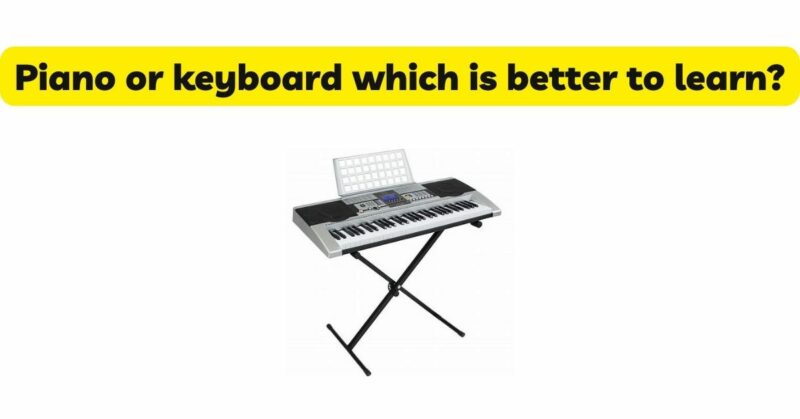Embarking on a musical journey is a remarkable endeavor, and selecting the right instrument is crucial for a fulfilling learning experience. When it comes to keyboard instruments, aspiring musicians often find themselves torn between the piano and the keyboard. In this article, we will explore the factors that can help determine the ideal instrument for learning, considering aspects such as sound, technique, versatility, cost, and long-term goals. By examining these factors, we can make an informed decision about whether the piano or keyboard is better suited for individual learning needs.
- Sound Quality and Authenticity:
One of the fundamental differences between the piano and the keyboard lies in their sound production. Pianos produce rich, resonant tones by employing hammers striking strings, creating a distinctive and authentic sound. The acoustic nature of a piano lends itself to expressive dynamics and nuances, making it an ideal choice for those seeking a traditional and organic sound.
In contrast, keyboards rely on digital sound sampling to replicate various instrument sounds, including piano tones. While advancements in technology have significantly improved the quality of keyboard sounds, they may still fall short of capturing the depth and complexity of a genuine piano. However, keyboards offer versatility in producing a wide range of sounds beyond the piano, which can be appealing to musicians exploring different genres and styles.
- Technique and Skill Development:
The development of proper technique is crucial for musical progression. Pianos require a more advanced technique due to their weighted keys, larger size, and the need for precise finger control. The weighted keys promote finger strength, dexterity, and control over dynamics, leading to a more nuanced and expressive performance. The techniques learned on a piano can be transferable to other keyboard instruments as well.
Keyboards, on the other hand, often have lighter and less resistant keys, making them initially easier to play. This can be advantageous for beginners who are still developing finger strength and coordination. However, the absence of weighted keys may hinder the development of proper technique and the ability to transition seamlessly to a piano in the future.
- Versatility and Musical Exploration:
Exploring a wide range of musical styles and genres is an important consideration for many learners. Keyboards offer a high level of versatility, providing access to an array of instrument sounds, effects, and accompaniment features. This versatility allows musicians to experiment with various musical styles, such as pop, rock, jazz, or electronic music. Keyboards can also be connected to computers and music production software, facilitating digital composition and recording.
Pianos, while less versatile in terms of sound options, excel in their ability to express emotions and dynamics through their acoustic nature. The piano’s timeless and distinctive sound makes it well-suited for classical, jazz, and contemporary piano repertoire. While the piano may have limitations in sound variety, it remains a foundational instrument that can enhance musicianship and lay a solid musical groundwork.
- Cost Considerations:
Financial considerations often play a role in choosing an instrument for learning. Pianos, especially high-quality acoustic pianos, can be a significant investment. The cost of purchasing and maintaining a piano, including tuning and repairs, can be substantial. However, there are also more affordable options available, such as digital pianos, which offer a compromise between cost and quality.
Keyboards, on the other hand, are generally more affordable compared to pianos. There is a wide range of keyboard options available, accommodating different budgets and skill levels. However, it is important to consider that lower-priced keyboards may have limitations in terms of sound quality, key action, and durability.
- Long-Term Goals and Musical Aspirations:
Considering long-term goals and musical aspirations is crucial when deciding between a piano and a keyboard. If a learner’s ambition is to become a classical pianist, a piano would be the preferred choice. The piano’s unique sound, expressive capabilities, and technical demands align with the requirements of classical repertoire.
However, if a learner’s interests are more focused on exploring various genres, composing, or producing music electronically, a keyboard may be a better fit. Keyboards provide opportunities for creative experimentation, recording, and incorporating modern technology into music-making. They also offer a smoother transition to digital music production and electronic music genres.
Conclusion:
Choosing between the piano and the keyboard for learning ultimately depends on individual preferences, goals, and resources. The piano offers a rich and authentic sound, challenges the development of proper technique, and can be a valuable investment for those dedicated to classical piano performance. Keyboards, while potentially lacking the acoustic depth and tactile experience of a piano, offer versatility, affordability, and opportunities for musical exploration in various genres.
It is important to remember that the choice of instrument is not fixed and can evolve over time. Many musicians start their journey on a keyboard and later transition to a piano or vice versa. Whichever instrument is chosen, dedication, practice, and guidance from experienced teachers or resources will ultimately determine the success and fulfillment of the learning journey.


